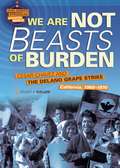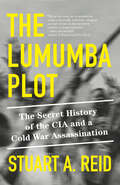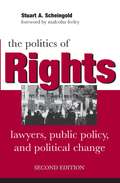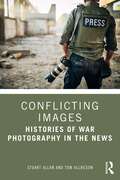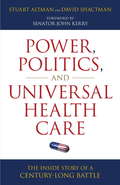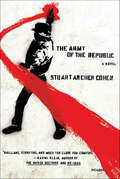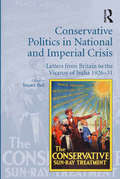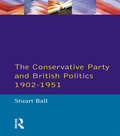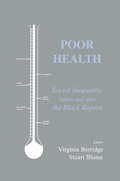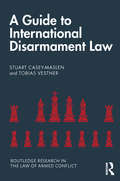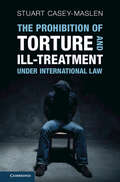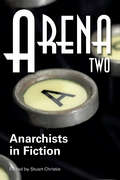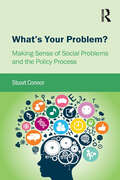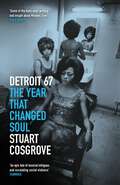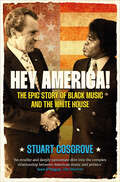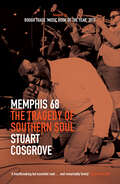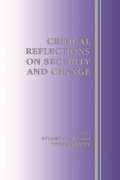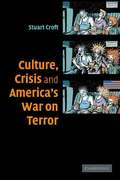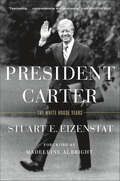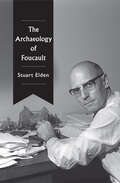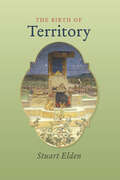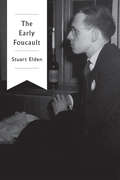- Table View
- List View
We are Not Beasts of Burden: Cesar Chavez and the Delano Grape Strike, California, 1965-1970 (Civil Rights Struggles Around the World)
by Stuart A. KallenRecounts the farmworkers' strike in Delano, California, Cesar Chavez's rise from local organizer to national civil rights hero, and how the United Farmworkers Union works to protect civil rights for agricultural laborers across America.
The Lumumba Plot: The Secret History of the CIA and a Cold War Assassination
by Stuart A. ReidThe New York Times Book Review Editors' Choice • A spellbinding work of history that reads like a Cold War spy thriller—about the U.S.-sanctioned plot to assassinate the democratically elected leader of the newly independent CongoA BEST BOOK OF THE YEAR: The New Yorker, The Economist, Financial Times&“This is one of the best books I have read in years . . . gripping, full of colorful characters, and strange plot twists.&” —Fareed Zakaria, CNN hostIt was supposed to be a moment of great optimism, a cause for jubilation. The Congo was at last being set free from Belgium—one of seventeen countries to gain independence in 1960 from ruling European powers. At the helm as prime minister was charismatic nationalist Patrice Lumumba. Just days after the handover, however, the Congo&’s new army mutinied, Belgian forces intervened, and Lumumba turned to the United Nations for help in saving his newborn nation from what the press was already calling &“the Congo crisis.&” Dag Hammarskjöld, the tidy Swede serving as UN secretary-general, quickly arranged the organization&’s biggest peacekeeping mission in history. But chaos was still spreading. Frustrated with the fecklessness of the UN and spurned by the United States, Lumumba then approached the Soviets for help—an appeal that set off alarm bells at the CIA. To forestall the spread of Communism in Africa, the CIA sent word to its station chief in the Congo, Larry Devlin: Lumumba had to go.Within a year, everything would unravel. The CIA plot to murder Lumumba would fizzle out, but he would be deposed in a CIA-backed coup, transferred to enemy territory in a CIA-approved operation, and shot dead by Congolese assassins. Hammarskjöld, too, would die, in a mysterious plane crash en route to negotiate a cease-fire with the Congo&’s rebellious southeast. And a young, ambitious military officer named Joseph Mobutu, who had once sworn fealty to Lumumba, would seize power with U.S. help and misrule the country for more than three decades. For the Congolese people, the events of 1960–61 represented the opening chapter of a long horror story. For the U.S. government, however, they provided a playbook for future interventions.
The Politics of Rights
by Stuart A. ScheingoldStuart A. Scheingold's landmark work introduced a new understanding of the contribution of rights to progressive social movements, and thirty years later it still stands as a pioneering and provocative work, bridging political science and sociolegal studies. In the preface to this new edition, the author provides a cogent analysis of the burgeoning scholarship that has been built on the foundations laid in his original volume. A new foreword from Malcolm Feeley of Berkeley's Boalt Hall School of Law traces the intellectual roots of The Politics of Rights to the classic texts of social theory and sociolegal studies.
Conflicting Images: Histories of War Photography in the News
by Stuart Allan Tom AllbesonIn contrast with historical examinations centring the evolving role of the war correspondent, Conflicting Images focuses on the contribution of photographers and photojournalists, providing an evaluative appraisal of war photography in the news and its development from the nineteenth century to the twenty-first century.Stuart Allan and Tom Allbeson critically explore diverse genres of war photography across a broad historical sweep, encompassing events from the Crimean War (1853–56) and the Civil War in the United States (1861–65) up to and including conflicts unfolding in Syria and Ukraine. This book reflects on the relevance of different types of warfare to visual reporting, from colonial conquest via trench warfare and aerial bombardment, to the ideological dimensions of the Cold War, and ‘embedding’ and ‘winning hearts and minds’ during the ‘War on Terror’ and its aftermath. In pinpointing illustrative examples, the authors examine changing dynamics of production, dissemination, and public engagement. Readers will come to understand how current efforts to rethink the future of war photography in a digital age can benefit from a close and careful consideration of war photography’s origins, early development, and gradual, uneven transformation over the years. Conflicting Images aims to invigorate ongoing enquires and inspire new, alternative trajectories for future research and practice.This book is recommended reading for researchers and advanced students of visual journalism and conflict reporting.
Power, Politics, and Universal Health Care
by Stuart AltmanWhy was the Obama health plan so controversial and difficult to understand? In this readable, entertaining, and substantive book, Stuart Altman--inter-nationally recognized expert in health policy and adviser to five US presidents--and fellow health care specialist David Shactman explain not only the Obama health plan but also many of the intriguing stories in the hundred-year saga leading up to the landmark 2010 legislation. Blending political intrigue, policy substance, and good old-fashioned storytelling, this is the first book to place the Obama health plan within a historical perspective. The authors describe the sometimes haphazard, piece-by-piece construction of the nation's health care system, from the early efforts of Franklin Roosevelt and Harry Truman to the later additions of Ronald Reagan and George W. Bush. In each case, they examine the factors that led to success or failure, often by illuminating little-known political maneuvers that brought about immense shifts in policy or thwarted herculean efforts at reform. Despite its importance in history, few people know that Richard Nixon marshaled the best attempt to enact universal health care; or that he arranged secret health policy meetings with aides to Ted Kennedy in the basement of a Washington, DC, church. Who knew that the American Medical Association (AMA) publicly questioned the surgeon general's report that tobacco was harmful in order to defeat the Medicare bill, or that three separate sex scandals obstructed the road to universal health care? The authors look at key moments in health care history: the Hill-Burton Act in 1946, in which one determined poverty lawyer secured the rights of the uninsured poor to get hospital care; the "three-layer cake" strategy of powerful House Ways and Means Committee Chairman Wilbur Mills to enact Medicare and Medicaid under Lyndon Johnson in 1965; the odd story of how Medicare catastrophic insurance was passed by Ronald Reagan in 1988 and then repealed because of public anger in 1989; and the fact that the largest and most expensive expansion of Medicare was enacted by George W. Bush in 2003. President Barack Obama is the protagonist in the climactic chapter, learning from the successes and failures chronicled throughout the narrative. The authors relate how, in the midst of a worldwide financial meltdown, Obama overcame seemingly impossible obstacles to accomplish what other presidents had tried and failed to achieve for nearly one hundred years. This book is essential reading for every American who must navigate the US health care system.
The Army of the Republic: A Novel
by Stuart Archer CohenIn an America stretched by crisis to the breaking point, billionaire entrepreneur and government insider James Sands is riding high. Over the protests of civic groups and the increasing alienation of his wife, Anne, Sands is poised on the brink of an immensely risky and controversial deal that will give him control of all public water in the Pacific Northwest. But when his business partner is murdered by a radical group called The Army of the Republic, Sands finds himself losing control of his business and his life. Desperate, he turns to Whitehall Security, a private intelligence firm with far-reaching political connections. For a steep monthly fee, Whitehall will hunt down and eliminate any threats to Sands's enterprise.Meanwhile, in Seattle, a young guerrilla named Lando leads The Army of the Republic into a dangerous war of ideals. Charismatic and cunning, Lando is obsessed with the goal of saving the country from its corrupt ruling alliance by any means necessary. His reluctant ally is political organizer Emily Cortright, coordinator of a network of civil, religious, and labor groups. Bound together in a web of common aims and conflicting loyalties, the two plan a massive peaceful protest against a conference of national business leaders, which they hope will stagger the Regime.Beyond his control, through, Lando's Army of the Republic has already unleashed a chain of events that will electrify and frighten an uneasy nation. Hemmed in by their lethal compromises, Emily, Lando, James, and Anne struggle to redeem or destroy those whom they love most.Thrilling and unforgettable, The Army of the Republic is a brilliant, provocative novel about what it means to live in a democracy.
Conservative Politics in National and Imperial Crisis: Letters from Britain to the Viceroy of India 1926-31
by Stuart BallWhilst serving in the prestigious post of Viceroy of India between 1926 and 1931, Lord Irwin (later the Earl of Halifax) was kept informed about political events in Britain by frequent and lengthy letters from Cabinet Ministers, senior Conservative MPs and other prominent figures, such as the editor of The Times. Covering events from the General Strike of May 1926 to Irwin’s negotiation of a pact with Gandhi in March 1931, these private and previously unpublished letters mix analysis and gossip. They offer a frank account from within the highest political circles of the Baldwin government of 1924-29 and the serious crisis in the Conservative Party which followed in 1929-31. There is also much commentary on major figures such as Stanley Baldwin, Neville Chamberlain, Winston Churchill and Ramsay MacDonald. Of great depth and richness, and emanating from experienced and shrewd political insiders, this collection is an essential historical source for British history between the two world wars.
The Conservative Party and British Politics 1902 - 1951 (Seminar Studies)
by Stuart BallThe history of the Conservative Party during the first half of the twentieth century was marked by crisis and controversy, from Joseph Chamberlain's tariff reform campaign through the Lloyd George coalition and the National Government between the wars to the defeat of 1945 and the post war recovery. This study provides a lucid account of this turbulent and formative period in the history of the most durable and adaptive force in modern British politics.
Poor Health: Social Inequality before and after the Black Report (British Politics and Society)
by Virginia Berridge Stuart BlumeThe 1980 Black Report by Sir Douglas Black has kept health inequalities at the forefront of the public health agenda. This volume explores the history and development of studies and concern over health inequalities especially in relation to the 1980 report.
A Guide to International Disarmament Law (Routledge Research in the Law of Armed Conflict)
by Stuart Casey-Maslen Tobias VestnerDisarmament is integral to the safeguarding and promotion of security, development, and human rights. Hundreds of millions of dollars are spent each year on disarmament operations, yet no comprehensive guide exists to explain clearly the international rules governing disarmament. This book seeks to fill that gap. It describes the international legal rules that govern disarmament and the operational, political, and technical considerations that govern their implementation. This book aims to support compliance, implementation, and further development of international disarmament law. Traditionally, disarmament focused on weapons of mass destruction. This remains a critically important area of work. In recent decades, the scope of disarmament has broadened to encompass also conventional weapons, including through the adoption of rules and regulations to govern arms transfers and measures to eliminate specific munitions from stockpiles and to destroy explosive remnants of war. There have also been four "generations" of programmes to address small arms and light weapons at national or sub-national level through disarmament, demobilisation, and reintegration (DDR) programmes during and following the end of armed conflict. While an internationally accepted definition of disarmament does not yet exist, it is widely agreed that disarmament encompasses or interrelates with prohibitions and restrictions on the development, production, stockpiling, testing, and transfer of weapons and on their destruction. In addition to clarifying these elements, chapters of this guide will also consider the relationship between disarmament and the law of armed conflict, and with the United Nations Security Council, human security, public health, and non-state actors.
The Prohibition of Torture and Ill-Treatment under International Law
by Stuart Casey-MaslenThe first comprehensive analysis of domestic and international law defining and prohibiting torture and other forms of ill-treatment, this groundbreaking work reviews the law on torture in countries around the world. It considers how international law governs the use of force by police against suspects held in custody and during protests, and the practice and outlawing of torture both in peacetime and during armed conflict. The analysis also includes the application of universal jurisdiction, which is used in the attempt to prosecute and punish torture committed anywhere in the world. The application and execution of the death penalty are also discussed in detail.
Weapons Under International Human Rights Law
by Stuart Casey-MaslenInternational human rights law offers an overarching international legal framework to help determine the legality of the use of any weapon, as well as its lawful supply. It governs acts of States and non-State actors alike. In doing so, human rights law embraces international humanitarian law regulation of the use of weapons in armed conflict and disarmament law, as well as international criminal justice standards. In situations of law enforcement (such as counterpiracy, prisons, ordinary policing, riot control, and many peace operations), human rights law is the primary legal frame of reference above domestic criminal law. This important and timely book draws on all aspects of international weapons law and proposes a new view on international law governing weapons. Also included is a specific discussion on armed drones and cyberattacks, two highly topical issues in international law and international relations.
Recalibrating Reform
by Stuart Chinn"This book deals with the conservative aftermath of several eras of reform in American history by pointing to the phenomenon of "recalibration". It demonstrates the difficulty of achieving substantive political change in American politics; elements of the old political order always somehow find ways to survive and reassert themselves after reform has occurred"--
Arena Two: Noir Fiction (Arena Journal)
by Stuart ChristieTapping into the rich seam of anarchist and libertarian currents in noir fiction, this collection of essays explores fictional atmospheres that are dark and sinister—but not without hope. The protagonists of these works are often profoundly flawed but have something of the romantic optimist about them—men and women driven to face moral challenges and to do battle with the forces of evil or banality. Among the authors discussed are Stig Dagerman, Andre Helena, Leo Malet, George Navel, Jean-Marc Raynaud, Leda Rafanelli, B. Traven, and Simone Weil. Also included are an analysis by Agustin Guillamon of Miguel Mir's Entre El Roig I El Negre, Massimo Ortalli's discussion of The Regeneration of an Anarchist, and essays by Simon Watson Taylor and Stephen Schwartz on the relationship between surrealism and anarchism.
What's Your Problem?: Making Sense of Social Problems and the Policy Process
by Stuart ConnorThis lively book provides an essential introduction to the critical analysis of social problems and the policy process. It argues that policy does not just have an impact of people’s lives, but that people can and should have an impact on policy. Rather than assuming that social policies reflect an inevitable response to pre-existing givens, the author adopts a more proactive position to show how a ‘problem’ is fabricated and how a particular response to a ‘problem’ is legitimated. He goes on to demonstrate how the struggle over the meaning and desirable response to a range of social issues continues to take place not only in Parliament, but across broadcast and print media and the numerous internet channels. The book provides students, practitioners and activists with a rationale for and means to read, write and perform policy analysis.Drawing on the notion of policy literacy, readers will be introduced to a range of resources to enable them to further develop the ability to both read (comprehend), write (create, design, produce) and perform (influence and shape) policies. The book is illustrated throughout with examples from historical and contemporary representations of social problems and local, national and global policy making and practice. Each section will make reference to a toolkit that tutors, student and activists can access to help inform their practice.Presented in an accessible format, the book demonstrates that making sense of social issues and the policy process, also means making sense of some of the fundamental questions, values and assumptions of how is / should society be organised and our own role in the shaping of society. In this way the book not only provides practical and critical insights into the policy process, but is also an intellectually challenging and stimulating read.
Detroit 67: The Year That Changed Soul (The Soul Trilogy #1)
by Stuart CosgroveFirst in the award-winning soul music trilogy—featuring Motown artists Diana Ross & the Supremes, Smokey Robinson, Marvin Gaye, and others. Detroit 67 is &“a dramatic account of twelve remarkable months in the Motor City&” during the year that changed everything (Sunday Mail). It takes you on a turbulent journey through the drama and chaos that ripped through the city in 1967 and tore it apart in personal, political, and interracial disputes. It is the story of Motown, the breakup of the Supremes, and the damaging clashes at the heart of the most successful African American music label ever. Set against a backdrop of urban riots, escalating war in Vietnam, and police corruption, the book weaves its way through a year when soul music came of age and the underground counterculture flourished. LSD arrived in the city with hallucinogenic power, and local guitar band MC5—self-styled holy barbarians of rock—went to war with mainstream America. A summer of street-level rebellion turned Detroit into one of the most notorious cities on earth, known for its unique creativity, its unpredictability, and self-lacerating crime rates. The year 1967 ended in social meltdown, rancor, and intense legal warfare as the complex threads that held Detroit together finally unraveled. &“A whole-hearted evocation of people and places,&” Detroit 67 is &“a tale set at a fulcrum of American social and cultural history&” (Independent).
Hey America!: The Epic Story of Black Music and the White House
by Stuart CosgroveThis is the untold story of black music – its triumph over racism, segregation, undercapitalised record labels, media discrimination and political anxiety – told through the perspective of the most powerful office in the world: from Louis Armstrong's spat with President Eisenhower and Eartha Kitt's stormy encounter with Lady Bird Johnson to James Brown's flirtation with Nixon, Reaganomics and the 'Cop Killer' scandal. Moving, insightful and wide-ranging, Hey America! charts the evolution of sixties soul from the margins of American society to the mainstream, culminating in the rise of urban hip-hop and the dramatic stand-off between Donald Trump and the Black Lives Matter movement.
Memphis 68: The Tragedy of Southern Soul (The Soul Trilogy #2)
by Stuart CosgroveSecond in the award-winning soul music trilogy following Detroit 67—featuring Memphis artists Isaac Hayes, Mahalia Jackson, Otis Redding, and others. In the 1950s and 1960s, Memphis, Tennessee, was the launchpad for musical pioneers such as Aretha Franklin, Elvis Presley, Johnny Cash, Al Green, and Isaac Hayes, and by 1968, it was a city synonymous with soul music. It was a deeply segregated city, ill at ease with the modern world and yet to adjust to the era of civil rights and racial integration. Stax Records offered an escape from the turmoil of the real world for many soul and blues musicians, with much of the music created there becoming the soundtrack to the civil rights movement. The book opens with the death of the city&’s most famous recording artist, Otis Redding, who died in a plane crash in the final days of 1967, and then follows the fortunes of Redding&’s label, Stax/Volt Records, as its fortunes fall and rise again. But as the tense year unfolds, the city dominates world headlines for the worst of reasons: the assassination of civil rights leader Martin Luther King Jr. Winner of the Penderyn Music Book Prize in 2018 &“As ever, Cosgrove&’s lucid, entertaining prose is laden with detail, but never at the expense of the wider narrative. Hinging on that Memphis destination, he traces the savage dichotomy at the city&’s heart: it was the site of multi-racial soul imprint Stax, but also the place where Martin Luther King was killed. A heartbreaking but essential read, and one that feels remarkably timely.&” —Clash Magazine
Critical Reflections on Security and Change
by Stuart Croft Terriff TerryThe contributors reflect critically on security studies since the 1980s. They conclude that analysts and policy-makers have not been able to respond well to the changes that have occurred and that they must revise their approach if they are to meet the challenges of the future.
Culture, Crisis and America's War on Terror
by Stuart CroftThis 2006 book examines the development of the 'war on terror' discourse and its evidence in American life.
President Carter: The White House Years
by Stuart E. EizenstatThe definitive history of the Carter Administration from the man who participated in its surprising number of accomplishments—drawing on his extensive and never-before-seen notes.Stuart Eizenstat was at Jimmy Carter’s side from his political rise in Georgia through four years in the White House, where he served as Chief Domestic Policy Adviser. He was directly involved in all domestic and economic decisions as well as in many foreign policy ones. Famous for the legal pads he took to every meeting, he draws on more than 5,000 pages of notes and 350 interviews of all the major figures of the time, to write the comprehensive history of an underappreciated president—and to give an intimate view on how the presidency works. Eizenstat reveals the grueling negotiations behind Carter’s peace between Israel and Egypt, what led to the return of the Panama Canal, and how Carter made human rights a presidential imperative. He follows Carter’s passing of America’s first comprehensive energy policy, and his deregulation of the oil, gas, transportation, and communications industries. And he details the creation of the modern vice-presidency. Eizenstat also details Carter’s many missteps, including the Iranian Hostage Crisis, because Carter’s desire to do the right thing, not the political thing, often hurt him and alienated Congress. His willingness to tackle intractable problems, however, led to major, long-lasting accomplishments. This major work of history shows first-hand where Carter succeeded, where he failed, and how he set up many successes of later presidents.
Terror and Territory: The Spatial Extent of Sovereignty
by Stuart EldenToday's global politics demands a new look at the concept of territory. From so-called deterritorialized terrorist organizations such as al-Qaeda to U.S.-led overthrows of existing regimes in the Middle East, the relationship between territory and sovereignty is under siege. Unfolding an updated understanding of the concept of territory, Stuart Elden shows how the contemporary "war on terror" is part of a widespread challenge to the connection between the state and its territory.Although the importance of territory has been disputed under globalization, territorial relations have not come to an abrupt end. Rather, Elden argues, the territory/sovereignty relation is being reconfigured. Traditional geopolitical analysis is transformed into a critical device for interrogating hegemonic geopolitics after the Cold War, and is employed in the service of reconsidering discourses of danger that include "failed states," disconnection, and terrorist networks.Looking anew at the "war on terror"; the development and application of U.S. policy; the construction and demonization of rogue states; events in Lebanon, Somalia, and Pakistan; and the wars continuing in Afghanistan and Iraq, Terror and Territory demonstrates how a critical geographical analysis, informed by political theory and history, can offer an urgently needed perspective on world events.
The Archaeology of Foucault
by Stuart EldenOn 20 May 1961 Foucault defended his two doctoral theses; on 2 December 1970 he gave his inaugural lecture at the Collège de France. Between these dates, he published four books, travelled widely, and wrote extensively on literature, the visual arts, linguistics, and philosophy. He taught both psychology and philosophy, beginning his explorations of the question of sexuality. Weaving together analyses of published and unpublished material, this is a comprehensive study of this crucial period. As well as Foucault’s major texts, it discusses his travels to Brazil, Japan, and the USA, his time in Tunisia, and his editorial work for Critique and the complete works of Nietzsche and Bataille. It was in this period that Foucault developed the historical-philosophical approach he called ‘archaeology’ – the elaboration of the archive – which he understood as the rules that make possible specific claims. In its detailed study of Foucault’s archive the book is itself an archaeology of Foucault in another sense, both excavation and reconstruction. This book completes a four-volume series of major intellectual histories of Foucault. Foucault’s Last Decade was published by Polity in 2016; Foucault: The Birth of Power followed in 2017; and The Early Foucault in 2021.
The Birth of Territory
by Stuart EldenPolitical theory professor Stuart Elden explores the history of land ownership and control from the ancient to the modern world in The Birth of Territory.Territory is one of the central political concepts of the modern world and, indeed, functions as the primary way the world is divided and controlled politically. Yet territory has not received the critical attention afforded to other crucial concepts such as sovereignty, rights, and justice. While territory continues to matter politically, and territorial disputes and arrangements are studied in detail, the concept of territory itself is often neglected today. Where did the idea of exclusive ownership of a portion of the earth’s surface come from, and what kinds of complexities are hidden behind that seemingly straightforward definition? The Birth of Territory provides a detailed account of the emergence of territory within Western political thought. Looking at ancient, medieval, Renaissance, and early modern thought, Stuart Elden examines the evolution of the concept of territory from ancient Greece to the seventeenth century to determine how we arrived at our contemporary understanding. Elden addresses a range of historical, political, and literary texts and practices, as well as a number of key players—historians, poets, philosophers, theologians, and secular political theorists—and in doing so sheds new light on the way the world came to be ordered and how the earth’s surface is divided, controlled, and administered.“The Birth of Territory is an outstanding scholarly achievement . . . a book that already promises to become a ‘classic’ in geography, together with very few others published in the past decades.” —Political Geography“An impressive feat of erudition.” —American Historical Review
The Early Foucault
by Stuart EldenIt was not until 1961 that Foucault published his first major book, History of Madness. He had already been working as an academic for a decade, teaching in Lille and Paris, writing, organizing cultural programmes and lecturing in Uppsala, Warsaw and Hamburg. Although he published little in this period, Foucault wrote much more, some of which has been preserved and only recently become available to researchers. Drawing on archives in France, Germany, Switzerland, Sweden and the USA, this is the most detailed study yet of Foucault’s early career. It recounts his debt to teachers including Louis Althusser, Jean Hyppolite, Maurice Merleau-Ponty and Jean Wahl; his diploma thesis on Hegel; and his early teaching career. It explores his initial encounters with Georges Canguilhem, Jacques Lacan, and Georges Dumézil, and analyses his sustained reading of Friedrich Nietzsche, Edmund Husserl and Martin Heidegger. Also included are detailed discussions of his translations of Ludwig Binswanger, Victor von Weizsäcker, and Immanuel Kant; his clinical work with Georges and Jacqueline Verdeaux; and his cultural work outside of France. Investigating how Foucault came to write History of Madness, Stuart Elden shows this great thinker’s deep engagement with phenomenology, anthropology and psychology. An outstanding, meticulous work of intellectual history, The Early Foucault sheds new light on the formation of a major twentieth-century figure.
